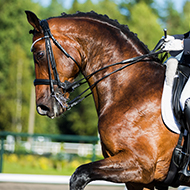British Equestrian lifts EHV-1 quarantine restrictions

British Equestrian has lifted the quarantine requirement for EHV-1.
British Equestrian has lifted the quarantine requirement for EHV-1 (equine herpesvirus), meaning horses can now return to the UK without needing to isolate.
The quarantine was put into effect by British Showjumping, British Eventing and British Dressage after the spread of EHV-1 was linked to competitions in the Iberian Peninsula in March. All horses associated with these shows will have completed the process early next week, and none showed any clinical signs on EHV on returning home.
While there continue to be infrequent outbreaks of EHV-1 in Europe and the UK, British Equestrian’s Equine Infectious Disease Advisory Group (EIDAG) has concluded that the prevalence of EHV-associated disease has returned to its typical background level.
A statement reads: ‘With immediate effect, this quarantine requirement has now been lifted and horses can return to the UK without any need to isolate. Horses going to European competitions may be required by the FEI to have pre-event testing and, for longer competitions, screening will be continuing during the competition.
‘This, together with other biosecurity measures put in place by the FEI, gives confidence that quarantine is no longer needed. However, similar restrictions will be re-activated if there are further EHV outbreaks and our experience this spring suggests that this is an effective means to protect British horses.
'Yards are urged to operate under a strict biosecurity plan to preserve the health of their horses and minimise the spread of infection and disease.’
EIDAG chairman, Professor Celia Marr, commented: “The EHV situation in March was an important wake-up call for us all – riders and owners should always be vigilant and take great care to monitor horses returning from competitions and introducing new horses to the yard, whether abroad or in the UK because serious diseases like EHV and Strangles can spread anytime groups of horses mix. Stringent biosecurity practice should be a priority on all yards.”



 The RCVS has announced a new version of its 1CPD mobile app, with enhanced features for veterinary surgeons and veterinary nurses to record their continuing professional development.
The RCVS has announced a new version of its 1CPD mobile app, with enhanced features for veterinary surgeons and veterinary nurses to record their continuing professional development.